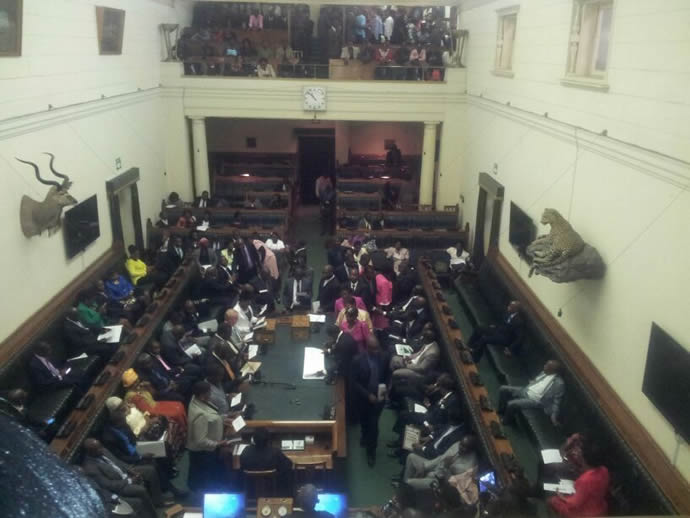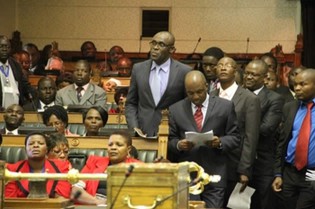Jobs for the ‘boys and girls’, mistresses and Ben 10s?


Legislators follow proceedings during the first sitting of the First Session of the Eighth Parliament of Zimbabwe while standing in the aisles owing to an acute shortage of sitting space in the National Assembly yesterday.
Lloyd GumboMr Speaker, Sir
Ministers overshadowing some of those ministries were at pains to explain what led to these top executives crossing the red line but still the people’s representatives in the third pillar of the State were not satisfied as they felt the ministers were being disingenuous.While some ministries took the initiative to expose the shenanigans happening at institutions that they shadow, some of them had to wait for the media to do the job for them.
The shortcomings with our laws is that we have given the responsibility to appoint boards of parastatals to individuals in the form of ministers who may naturally be tempted to appoint their childhood friends, mistresses or ‘Ben 10s’ in contravention of Chapter 9 Section (194) (2) of the constitution on basic values and principles governing public administration.
The section says appointments to offices in all tiers of government, including government institutions, agencies, government-controlled entities and other public enterprises, must be made primarily on the basis of merit.
The situation is compounded by the fact that some ministers become compromised as they take freebies from these top executives in the form of fuel and allowances from parastatals that fall under them while others go to the extent of buying personal items on credit using accounts of state entities under them.
This happens despite the fact that these ministers are already entitled to and receive the same under their ministries’ budget.
This to an extent allows the top executives to then abuse and misappropriate funds as they feel they would have put “the boss” under their armpits.
There is also a possibility of ministers influencing the appointing of top management at parastatals under their ambit, something that is now known as “the minister’s people”, leaving the board powerless to reprimand these executives when they fail to perform their mandate.
The constitution on Chapter 9, Section 198 says;
“An Act of Parliament must provide measures to enforce the provisions of this Chapter, including measures:
(a) requiring public officers to make regular disclosures of their assets;
(b) establishing codes of conduct to be observed by public officers;
(c) specifying the standards of good corporate governance to be observed by government-controlled entities and other commercial entities owned or wholly controlled by the State;
(d) providing for disciplining of persons who contravene the provisions of this Chapter or of any code of conduct or standard referred to in paragraph.”
The fact that there is no such legislation yet means the parastatal bosses accused of obscenely paying themselves outrageous perks may go scot-free despite the existence of Sub Section (d).
Parliament’s role should not end with making the right noises about how they detest corruption but they must play a leading role in the appointment of boards and top management at state parastatals by virtue of being MPs — the primary expression of the people’s will — than leaving such appointments to be monopolised by individuals.
In exercising this mandate, Parliament through its Standing Rules and Orders Committee and the portfolio and thematic committees overshadowing a particular ministry, must conduct public interviews when appointing people to superintend over such institutions.
This they can do on behalf of the electorate whom state parastatals were created to serve.
The way Parliament conducted interviews for commissioners during the Inclusive Government era must be the standard for all public appointments.
Parliament has the paramount responsibility of fighting corruption as they exercise their oversight role over the executive.
Council of Europe’s Parliamentary Assembly and the World Bank in the handout; “Role of parliaments in fighting corruption” say the legislature must have the primary responsibility of combating corruption in all its forms especially in public life and the economy.
“Parliaments must undertake this task for the general morality of society, but also for its lasting economic progress which vitally depends on honesty and trust.
As Europe — and the world — come together, this struggle becomes both more complex and urgent.
“The Council of Europe, its Parliamentary Assembly and national parliaments must be in the forefront of promoting good governance in Europe and worldwide and of raising awareness of the dangers of corruption,” they concluded.
Corruption and misappropriation of funds hurt the powerless electorate.
There is no doubt that corruption undermines the State and values of democracy and for that reason the legitimacy of Parliament must be measured by the way it executes its mandate through protecting the interests of the public by curbing corruption.
But for Parliament to exercise that mandate, there is need for mechanisms to be put in place through legislation so that it can directly shadow parastatals.
It is not enough for MPs to summon boards and top executives to give oral evidence of how their parastatals are performing.
Dr Livingston Smith, Chairperson of the Department of Social Sciences and Associate Professor at the University College of the Cayman Islands, in an opinion article in Cayman Net News, said parliament was the legitimate focal point for fighting corruption.
“A parliament, steeped in the principles of democracy, is best able to fight corruption in its various manifestations: state capture, fraud, embezzlement, nepotism, cronyism, bribery, extortion, rent-seeking, kick-backs, clientelism, graft, commission and conflict of interest,” he said.
It therefore becomes imperative that Parliament is not only there to make the right noises about the need to stop corruption but it must be enabled to avoid it by participation in the appointment of boards and top management of parastatals.
If as a country we do not yet appreciate the threat of corruption to development then only God knows when we will wake up to only find crumbs left.
Feedback: [email protected]









Comments